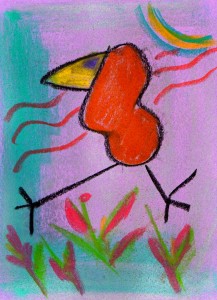Just playing around
Very young kids like to play and are good at it. When they get older they continue to spend lots of time at play but the nature of that play changes. They like all kinds of games that simulate facets of the world around them, such as sports, computer games imagination games in which kids are heroes.
Walk through an elementary school and look at the artwork up on the walls. What you see is the freedom of the kindergarten kids, and the creativity is very evident through the first few grades and then it levels off. By the fifth grade the art work is generally constrained, less creative, tight, except for a few of the art-gifted kids who stand out from the rest.
What happens to play during adolescence and then into adult years? Obviously people continue to play at play-designated times. Adults can play in sports, vacation, sing on karaoke night. What is less prominent in most adults is play as a tool at work. Lots of animals engage in play throughout their lives but that is not as prominent in adult humans.
The value and function of play has been given a neuroscience face in the research of scientists such as Elizabeth Spelke and Alison Gopnik. For example Gopnik, in her studies of children’s play makes the distinction between play that is exploratory (what kids do) and play that is exploitive (often how adults play). Exploitive play relies heavily on well-developed biases, which then limits the range of possible outcomes and opportunities to learn new things. Some adults continue to play in a much more open, less constrained way and that results in creative solutions to complex problems, which are less likely to happen when biases restrict the range of thought. Gopnik elaborates on that theme in her book “The Scientist in the Crib”.
Play is an important feature of our cognitive lives. In play we can be productive in ways that are not possible when we are handicapped by strong biases. Play is a mind tool that successful adults have to hone just like any other cognitive tool. Very young children don’t have to deliberately choose to play but playful adults have learned to not lose that skill and use it to their advantage.
